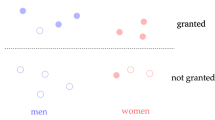Abstract
With the rise of artificial intelligence and machine learning in the last decade, there has been an increasing interest in developing a solid theory and implementing algorithmic fairness, which has eventually resulted in a large volume of work over the past few years. Despite the enormous amount of work done on the topic over a concise period, there has been little consensus of a unifying theory of algorithmic fairness. In this paper, we develop a notion of fairness that is based on the notion of discrepancy of set systems, a widely studied topic in the theory of computer science and combinatorics. (Chazelle Bernard in The discrepancy method: randomness and complexity. Cambridge University Press (2001)).




Similar content being viewed by others
References
Chazelle Bernard (2001) The discrepancy method: randomness and complexity. Cambridge University Press
Mehrabi Ninareh et al (2021) A survey on bias and fairness in machine learning. ACM Comput Surv (CSUR) 54.6:1–35
Zafar Muhammad Bilal et al (2019) Fairness constraints: a flexible approach for fair classification. J Mach Learn Res 20.1:2737–2778
Barocas S, Hardt M, Narayanan A (2017) Fairness in machine learning. Nips tutorial 1:2017
Patro Gourab K et al (2020) Fairrec: Two-sided fairness for personalized recommendations in two-sided platforms. Proceedings of the web conference
Morik Marco et al (2020) Controlling fairness and bias in dynamic learning-to-rank. Proceedings of the 43rd international ACM SIGIR conference on research and development in information retrieval
Feldman Michael et al (2015) Certifying and removing disparate impact. In: Proceedings of the 21th ACM SIGKDD international conference on knowledge discovery and data mining, pp 259–268
Louizos Christos et al (2017) The variational fair autoencoder
Corbett-Davies S, Sharad Goel (2018) A critical review of fair machine learning, the measure and mismeasure of fairness
Menon Aditya Krishna, Robert C Williamson (2017) The cost of fairness in classification. arXiv preprint arXiv: 1705.09055
Chouldechova A (2017) Fair prediction with disparate impact: a study of bias in recidivism prediction instruments. Big data 5(2):153–163
Kleinberg Jon et al (2018) Algorithmic fairness. Aea papers and proceedings. Vol. 108
Higgins Irina et al (2018) Towards a definition of disentangled representations. arXiv preprint arXiv: 1812.02230
Sattigeri Prasanna et al (2019) Fairness GAN: generating datasets with fairness properties using a generative adversarial network. IBM J Res Dev 63.4/5:3-1
Noriega-Campero Alejandro et al (2019) Active fairness in algorithmic decision making. Proceedings of the 2019 AAAI/ACM conference on AI, ethics, and society
Locatello Francesco et al (2019) On the fairness of disentangled representations. Adv Neural Inf Process Syst 32:14611–14624
Valdivia A, Sánchez-Monedero J, Casillas J (2021) How fair can we go in machine learning? Assessing the boundaries of accuracy and fairness. Int J Intell Syst 36(4):1619–1643
Villar David, Jorge Casillas (2021) Facing many objectives for fairness in machine learning. International conference on the quality of information and communications technology. Springer, Cham
Zhang Yue, Ramesh Arti (2020) Learning fairness-aware relational structures. arXiv preprint arXiv: 2002.09471
Corput JG (1935) van der: Verteilungsfunktionen. Proc. Ned. Akad. v. Wet. Vol 38
Tao Terence (2016) The Erdös discrepancy problem. Discrete Analysis: 609
Spencer J (1985) Six standard deviations suffice. Trans Am Math Soc 289(2):679–706
Bansal Nikhil (2010) Constructive algorithms for discrepancy minimization. 2010 IEEE 51st annual symposium on foundations of computer science. IEEE
Lovett S, Meka R (2015) Constructive discrepancy minimization by walking on the edges. SIAM J Comput 44(5):1573–1582
Larsen Kasper Green (2019) Constructive discrepancy minimization with hereditary L2 guarantees. 36th International symposium on theoretical aspects of computer science
Charikar Moses, Newman Alantha, Nikolov Aleksandar (2011) Tight hardness results for minimizing discrepancy. Proceedings of the twenty-second annual ACM-SIAM symposium on Discrete Algorithms. Society for Industrial and Applied Mathematics
Kearns Michael et al (2018) Preventing fairness gerrymandering: auditing and learning for subgroup fairness. International conference on machine learning. PMLR
Doerr B, Srivastav A (2003) Multicolour discrepancies. Comb Probab Comput 12(4):365–399
Beck J, Fiala T (1981) Integer-making’’ theorems. Discret Appl Math 3(1):1–8
Kelkar Shreeharsh (2013) The elite’s last stand: negotiating toughness and fairness in the IIT-JEE, 1990-2005
Propublica Risk Assessment. https://www.propublica.org/article/machine-bias-risk-assessments-in-criminal-sentencing
Adult Dataset. https://archive.ics.uci.edu/ml/datasets/adult
Tabibnia G, Lieberman MD (2007) Fairness and cooperation are rewarding: evidence from social cognitive neuroscience. Ann N Y Acad Sci 1118(1):90–101
Crockett Molly J et al (2008) Serotonin modulates behavioral reactions to unfairness. Science 320.5884:1739–1739
Tabibnia G, Satpute AB, Lieberman MD (2008) The sunny side of fairness: preference for fairness activates reward circuitry (and disregarding unfairness activates self-control circuitry). Psychol Sci 19(4):339–347
Acknowledgements
This paper is an outcome of the R&D work undertaken project under the Visvesvaraya PhD Scheme of the Ministry of Electronics & Information Technology, Government of India, being implemented by Digital India Corporation. We are thankful to the anonymous reviewers who gave us the motivation to improve this paper.
Author information
Authors and Affiliations
Corresponding author
Additional information
Publisher's Note
Springer Nature remains neutral with regard to jurisdictional claims in published maps and institutional affiliations.
Rights and permissions
About this article
Cite this article
Saraswat, A., Pal, M., Pokhriyal, S. et al. Towards fair machine learning using combinatorial methods. Evol. Intel. 16, 903–916 (2023). https://doi.org/10.1007/s12065-022-00702-5
Received:
Revised:
Accepted:
Published:
Issue Date:
DOI: https://doi.org/10.1007/s12065-022-00702-5




